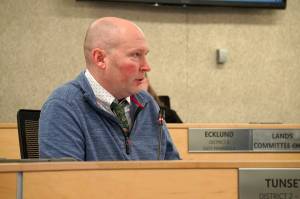Soldotna RV park tenants sue landlords, alleging toxic water supply, fraudulent electricity charges
Published 10:30 pm Monday, December 11, 2023
Nineteen residents of a mobile home park in Soldotna are suing their landlords for alleged violations of the Alaska Uniform Residential Landlord and Tenant Act. Tenants of the River Terrace RV Park, located near where the Sterling Highway crosses the Kenai River in Soldotna, filed a suit Monday in Kenai Superior Court and are being represented by the Northern Justice Project, a civil rights firm out of Anchorage.
The suit alleges that the defendants — Brian Bishop and Gary Hinkle, doing business as River Terrace RV Park — have been “effectively poisoning” the plaintiffs by supplying them with well water contaminated with arsenic, have failed to supply tenants with adequate water pressure and are mischarging tenants for electricity. The suit goes on to say that the landlords plan to close the RV park “for unclear reasons, rather than provide tenants with safe and reliable water.”
The plaintiffs in the case reflect a diversity of tenants. Three plaintiffs have lived in the park for more than 20 years and all but three pay either $426 per month or $436 per month for rent. Tenants were served eviction notices in July that asked them to vacate the property by May 2024.
The suit also makes reference to the Soldotna Riverfront Redevelopment Project, which seeks to redevelop 85 acres of land between the Sterling Highway and the Kenai River in Soldotna. The project area includes the 9.7-acre site of the River Terrace RV Park, although both the property owner and the City of Soldotna have said the planned eviction of tenants is unrelated to the project.
The property on which the River Terrace RV Park sits has a known history of contamination and appears in the Alaska Department of Environmental Conservation’s database of contaminated sites. The contamination can be traced to a dry-cleaning business that operated on the property between the 1960s and the 1980s, which the suit says Hinkle owned and operated.
Speaking to the Clarion in August as a lawyer for property owners Gary and Judith Hinkle, attorney Jim Butler said the department’s cleanup work at the site had shifted from active mitigation to annual monitoring.
The suit says the Alaska Department of Environmental Conservation told tenants in 2000 via a Drinking Water Quality Report that their water had elevated levels of arsenic, but that the levels were not in violation of the law. The following year, the U.S. Environmental Protection Agency strengthened protections against arsenic contamination by lowering the acceptable level from 50 parts per billion to 10 parts per billion.
The lawsuit alleges that the defendants “never brought River Terrace’s water supply into the safe range for arsenic,” and says water testing since 2000 has found arsenic concentrations ranging from 15 parts per billion to 45 parts per billion. The site’s most recent arsenic notice, the suit says, found that plaintiffs’ water had an arsenic concentration of 44.6 parts per billion.
The suit says tenants were notified in 2009 and 2011 that their water had unsafe levels of arsenic. The defendants allegedly told tenants in 2008, 2009 and 2011 that they had been granted an exemption to the new EPA standards, although their explanation for why the exemption was given changed.
At the end of 2011, when the exemption expired, the suit says River Terrace applied for another exemption from the Department of Environmental Conservation, which was denied.
“Defendants do not alert new or prospective tenants that the water has unsafe levels of arsenic,” the suit says. “Instead, residents learn about the arsenic only after moving into the Park, when a quarterly Arsenic Notice is posted on their trailer stating that the water is unsafe to drink.”
The suit says the defendants connected River Terrace’s seasonal RV spaces to the City of Soldotna’s water supply, but did not connect the plaintiffs’ mobile home spaces. Further, the suit alleges that the defendants never installed arsenic treatment filters on their well water system and that some of the park’s minor residents “have been exposed to unsafe levels of arsenic their entire lives.”
In addition to alleging that unsafe levels of arsenic in the water supply have gone unaddressed, the suit says tenants have regularly experienced low water pressure and, in some instances, have been “without running water for months on end.” Residents, the suit says, have been without adequate water pressure since June 2023 and the water “has stopped running almost completely” since October.
“When it does run, it comes out as a dripple and contains sediments and other residues,” the suit says.
As a result, the suit says residents work around the problem. One reported hauling in 5-gallon buckets from a nearby gas station, while another said he pays for sewage pumping services. The landlords make available a public shower that the suit says stays unlocked and cannot accommodate tenants in wheelchairs, and also gives tenants a “low water pressure credit” on their monthly bill.
The plaintiffs allege that they’re also expected to pay for electricity charges that don’t match the amount of electricity being used, and that eviction notices served in July were not uniform. Tenants living in fifth wheel trailers, for example, did not receive an eviction notice but are still being evicted, the suit says.
The challenges associated with moving are greater for mobile home tenants, the suit says, because it can be expensive to move their housing structure, which may also sustain damage in the process.
“Moving a mobile home also assumes there is an existing space available in another park within feasible distance and that the mobile home is new enough to comply with zoning laws,” the suit says. “When mobile home tenants are forced to move from a park, they often must abandon their home— and the wealth they had accumulated with the structure.”
In filing suit, the plaintiffs are seeking an injunction to stop the planned evictions, damages including full back rent, punitive damages and attorney’s fees.
As of Thursday, neither Hinkle nor Bishop had an attorney listed in CourtView, the Alaska Court System’s public online court website. Butler could not be reached for comment due to travel.
Reach reporter Ashlyn O’Hara at ashlyn.ohara@cmg-northwest2.go-vip.net/peninsulaclarion.





